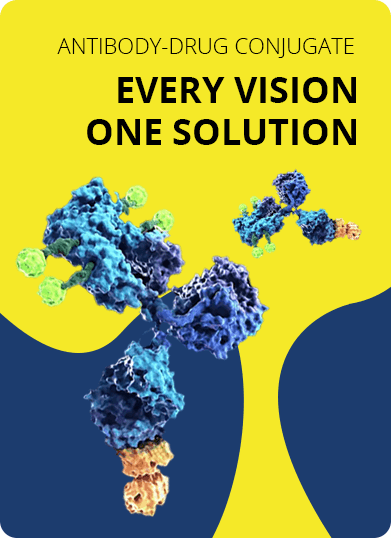FAQs
Q1: What is the antibody-drug conjugate?
A: Antibody-drug conjugate (ADC) is a type of cancer-targeting therapy that utilizes a potent cytotoxic drug coupled to an antibody via a covalent linker molecule. It offers both the targeting advantages of antibodies and an expanded therapeutic window for the payloads.
Q2: Are all ADCs cytotoxic?
A: Not all ADCs are cytotoxic, but most ADCs are made by conjugating monoclonal antibodies to a cytotoxic load. Of course, there are some other forms of conjugated therapies, such as immunostimulants.
Q3: What are the most common combinations of ADC construction?
A: ADCs are composed of three main parts, namely antibody, linker, and payload. Firstly, common forms of antibodies are monoclonal antibodies, bispecific antibodies, and antibody fragments.
Next, the linkers are divided into cleavable and non-cleavable linkers. The cleavable linkers include pH-sensitive (acid-labile) linkers, disulfide linkers, protease-sensitive (peptide) linkers, and β-glucuronide linkers, While ADCs with non-cleavable linkers are limited to antigen-positive tumor cells.
Thirdly, common payloads include microtubule toxins, DNA toxins, transcription toxins, inhibitors, and other payloads such as Nano-carriers, protein toxins, and toxic proteins.
Q4: What types of antibodies can be used in the construction of ADCs?
A: IgG1, IgG2, IgG4, nano-antibodies, and bispecific antibodies have been used in ADC construction. Creative Biolabs offers a range of services to its customers for fragment antibody conjugates. These services include Fab-drug conjugates, scFv-drug conjugates, and sdab-drug conjugates.
Q5: What effect do different types of antibodies have on ADC molecules?
/ A: Antibody property is a key element in the development of ADC. The affinity, stability, drug loading, binding site, and internalization efficiency of an ADC may be affected by the antibody property.
Q6: What are the general principles of ADC design?
A: The design principles of ADCs include: I. selection of appropriate antibodies; II. selection of appropriate cytotoxins; III. selection of appropriate connection methods; Ⅳ. determination of appropriate drug ratio.
Q7: Can the ADCs provided by Creative Biolabs be used in clinical treatment?
A: No, the products we offer are only suitable for laboratory research.
Q8: Can antibodies be customized according to the experimental needs?
A: We can customize the right antibody for you based on your experiment. You only need to provide the basic information of the protein (antigen), and we will develop the right antibody for you.
Q9: I only have the target of interest, but I don't know how to design the ADC for targeting.
A: First select a specific research direction based on the identified targets, then determine the appropriate mAb according to the identified matters, and finally choose the appropriate linker and payload according to the mAb.
Q10: I have identified the target antibody, but I don't know how to choose the payload and the corresponding DAR.
A: The appropriate payload is generally found based on the specific antibody. Payload often needs to meet several basic requirements: strong cytotoxicity, retention of activity after conjugation, acceptable aqueous solubility, stability under aqueous and physiological conditions, and a clear mechanism of action. The default option is the vc-MMAE.
Currently, DAR can be determined by hydrophobic interaction chromatography, reversed-phase liquid chromatography, liquid mass spectrometry, UV-Vis spectroscopy, and capillary electrophoresis-sodium dodecyl sulfate.
Q11: What services can Creative Biolabs provide for ADC development?
A: Creative biolabs can provide one-stop ADC development services, including but not limited to antibody screening and conjugation, drug and linker synthesis, in vivo and in vitro experimental analysis and ADC Manufacturing.
Q12: Can Creative Biolabs offer preclinical bioconjugation services?
A: Yes, Creative Biolabs provides a variety of bioconjugation services, covering antibody-drug conjugate, antibody-antibiotic conjugate, antibody-enzyme conjugate, antibody-biopolymer conjugate, antibody-immuostimulant conjugate, and antibody-Oligo conjugate.
Q13: Does Creative Biolabs have chromatography capabilities for conjugation?
A: Creative Biolabs has an advanced tomography technology platform and decades of experience with exceptionally powerful chromatography to simplify ADC production.
Q14: Which ADC payloads has Creative Biolabs conjugated?
A: Creative Biolabs has an extensive ADC payload library to fulfill clients' research needs. Payloads range from microtubule toxins, DNA toxins, transcription toxins, nanocarriers, protein toxins, and toxic enzymes.
Q15: How does Creative Biolabs deliver ADC drug substance?
A: ADC deliverables will be stable ADC in physiological buffer (e.g. PBS) with defined concentration and DAR, aggregation < 10%, and unconjugated Ab < 10%.
Q16: What are Creative Biolabs' ADC analytical capabilities?
A: Empowered by our advanced high-resolution analytical platforms and experienced technical personnel, Creative Biolabs can not only provide ADC in vitro analysis and characterizations, but also assessment of ADC in vivo pharmacokinetic properties, ADME pattern, efficacy, potential immunogenicity, and safety.
Q17: Is Creative Biolabs able to perform extensive ADC in vitro analysis?
A: Of course. Creative Biolabs provides a comprehensive collection of ADC in vitro analysis services to help our clients' research projects move faster, which are classified as biochemical analysis (structural analysis, ADC stability analysis, DAR determination, conjugation site analysis), in vitro efficacy (ADC affinity evaluation, internalization assays, cytotoxicity assays, ADCC and CDC assays), and 3D in vitro (ADC targeting profile, ADC tumor penetration, ADC solid tumor efficacy).
Q18: What conjugation technologies does Creative Biolabs employ?
A: Creative Biolabs has more than a decade of experience in various bio-conjugation strategies, including lysine-based conjugation, cysteine-based conjugation, tyrosine-based conjugation, EnCys-mAb based conjugation, UAA-based conjugation, enzyme-mediated conjugation, intein-fusion technology, and carbohydrate-based conjugation.
Q19: How is the communication going once the project starts?
A: Creative biolabs assigns a project manager to each project to enable timely communication throughout the process and timely completion of the project.
Q20: Why should I work with creative biolabs?
A: Creative Biolabs' expertise in antibody production and conjugation is extensive. Our comprehensive analysis platform and skilled scientific staff can expedite the research process. We always collaborate with you and offer data-driven insights at critical decision moments.
For Research Use Only. NOT FOR CLINICAL USE.

Online Inquiry
Welcome! For price inquiries, please feel free to contact us through the form on the left side. We will get back to you as soon as possible.
